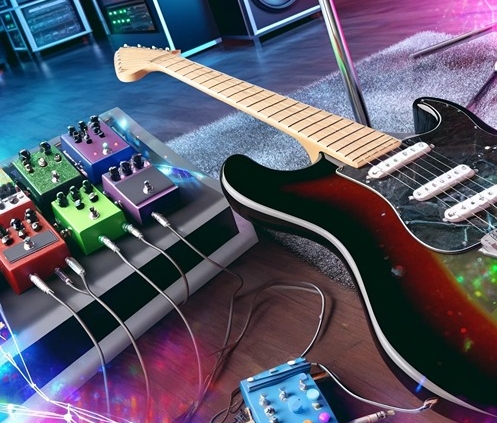Incorporating Guitar in Electronic Music: A Fusion of Tradition and Innovation
/by Dennis WingeIn the evolving landscape of music, the guitar remains a versatile instrument capable of adapting to various genres, including electronic music. This integration not only enriches the sonic palette of electronic compositions but also provides a bridge between traditional musicianship and contemporary production techniques. This blog post explores the dynamic role of guitar in electronic music, offering insights into its application, benefits, and innovative approaches that artists can adopt to create unique soundscapes.
The Role of Guitar in Electronic Music
Electronic music, characterized by its use of synthesized sounds and digital production, might not seem like the most natural habitat for the guitar. However, the inclusion of guitar in electronic compositions can add warmth, organic texture, and a human touch to tracks that might otherwise feel overly mechanical or synthesized. Guitars can introduce melodic lines, rhythmic patterns, or even just atmospheric noise, which enhances the emotional and dynamic range of electronic music.
Techniques for Integrating Guitar into Electronic Tracks
- Layering and Texturing: One common approach is using the guitar to add layers and texture to a track. This can be achieved through various effects such as reverb, delay, or modulation, which transform the guitar’s natural sound into something that complements electronic synths and beats.
- Looping and Sampling: Guitar loops can be particularly effective in electronic music. By recording a series of chords or notes and looping them throughout a track, guitarists can create a hypnotic effect that lends itself well to the repetitive nature of much electronic music. Additionally, sampling small segments of guitar playing and manipulating them digitally can yield interesting and innovative sounds.
- Hybrid Picking Techniques: Incorporating techniques like hybrid picking can bridge the gap between electronic and acoustic playing styles. This technique involves using a pick and fingers simultaneously, allowing for a mixture of strummed chords and melodic lines, ideal for versatility in electronic music contexts.
- Live Processing: Using MIDI controllers and real-time processing tools, guitarists can manipulate their live guitar sounds in the studio or during performances. This can include pitch shifting, time-stretching, or applying complex filters and envelopes that synchronize with other electronic elements in the mix.
Benefits of Adding Guitar to Electronic Productions
- Enhanced Musicality: The guitar brings a human element to electronic music, contributing to a richer, more layered listening experience. It allows composers to infuse improvisational qualities and natural dynamics into their tracks.
- Diversification of Sound: Incorporating guitar can help an electronic music producer stand out from the crowd by merging acoustic and electronic elements in innovative ways, offering listeners a unique sound.
- Greater Emotional Impact: The natural timbre of the guitar can evoke emotions that might be harder to achieve with synthesized sounds alone, making the music more relatable and impactful.
Innovative Examples and Applications
Many artists have successfully integrated guitar into their electronic tracks, demonstrating the instrument’s adaptability and impact. For instance, Radiohead’s use of guitars in an otherwise electronic landscape on albums like “Kid A” shows how the instrument can be used to add depth and complexity to electronic arrangements. Similarly, bands like Tycho utilize the guitar not just as a rhythmical backbone but also as a lead melodic instrument, seamlessly blending it with lush electronic backgrounds.
Conclusion
The fusion of guitar and electronic music opens up a world of creative possibilities. By blending traditional guitar techniques with modern production methods, musicians can expand their artistic horizons and develop a distinctive sound that appeals to both old and new audiences. As electronic music continues to dominate the musical landscape, the role of the guitar is as relevant as ever, proving that even the most traditional instruments have a place in the future of music.
—
Sign up for a free trial lesson if you want to see if Guitar Lessons Ithaca is a good fit for you. We offer lessons both in person and online. Simply fill out this form to get started.


